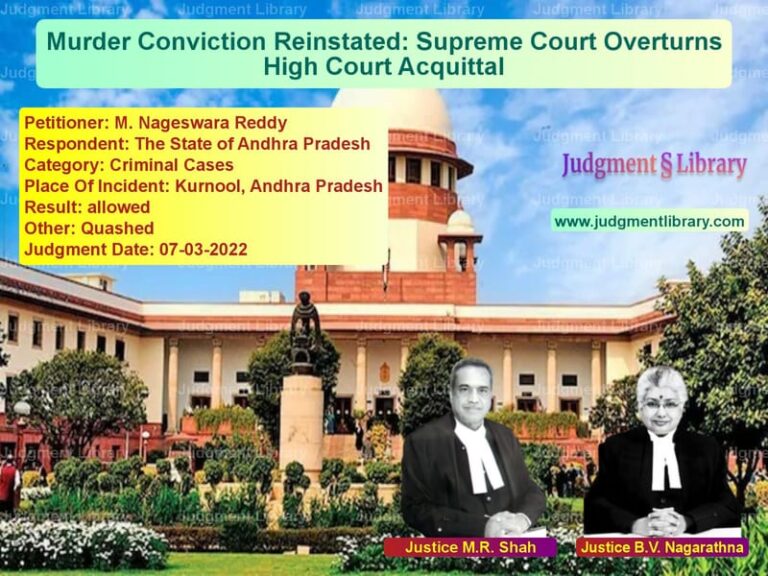Supreme Court on Legal Aid: Ensuring Effective Representation for Underprivileged Citizens
The Supreme Court of India recently issued a landmark ruling in the case of Brijesh Kumar vs. State of Uttar Pradesh, addressing critical issues regarding legal aid and the representation of underprivileged individuals in criminal trials. The judgment focused on the need for adequate legal representation and the role of the Legal Services Authorities in ensuring fair trials.
Background of the Case
Brijesh Kumar, the petitioner, had been convicted by the Trial Court and the High Court for multiple offenses, including robbery and murder. He filed a Special Leave Petition (SLP) before the Supreme Court, challenging his conviction and alleging that his legal representation was inadequate.
Read also: https://judgmentlibrary.com/joint-liability-in-criminal-law-supreme-court-clarifies-section-34-ipc/
During the hearing, the Supreme Court noted several deficiencies in the provision of legal aid, particularly concerning the support provided to amicus curiae and legal aid counsel representing indigent accused persons.
Key Legal Issues
- Whether the petitioner had received effective legal representation during his trial and appeals.
- Whether the Legal Services Authorities Act, 1987, adequately fulfilled its mandate of providing free and competent legal services to underprivileged individuals.
- What measures should be implemented to ensure that legal aid counsels receive the necessary materials for effective representation?
Arguments by the Petitioner (Brijesh Kumar)
- The petitioner argued that he had not received proper legal representation at trial and appellate stages.
- His legal aid counsel was not provided with complete case records, which hindered his defense.
- The failure of the authorities to ensure competent legal representation violated his fundamental right under Article 21 of the Constitution (Right to Life and Personal Liberty).
Arguments by the Respondent (State of Uttar Pradesh)
- The state contended that the petitioner had been provided legal aid and that he was represented by competent counsel.
- They argued that any shortcomings in representation did not impact the fairness of the trial.
- The state emphasized that the Legal Services Authorities functioned effectively and that the petitioner’s conviction was based on substantial evidence.
Supreme Court’s Observations
- The Court emphasized that the right to legal representation is central to the right to a fair trial and must not be denied based on economic status.
- It noted that legal aid counsels and amicus curiae often face challenges due to inadequate support from the legal aid authorities.
- The judgment highlighted that failure to provide full case records to legal aid counsel seriously undermines the effectiveness of representation.
- The Court observed:
“For legal representation to be meaningful, it must not make distinctions between the rich and the poor. The right to legal representation, as necessitated by justice and equity, must not be unfazed by the economic class or financial resources of the accused.”
Supreme Court’s Final Verdict
- The Court dismissed the Special Leave Petition, upholding the conviction.
- However, it issued crucial directions to improve legal aid services, including:
- Ensuring that all legal aid counsel and amicus curiae are provided with complete case records.
- Directing the National Legal Services Authority (NALSA) and state legal services authorities to establish mechanisms for timely provision of case materials.
- Mandating High Courts and Trial Courts to verify that legal aid counsels receive all necessary documents before hearings.
Impact of the Judgment
- Strengthening Legal Aid: The ruling ensures that legal aid is more effective and meaningful.
- Accountability of Legal Services Authorities: It places greater responsibility on the National and State Legal Services Authorities.
- Fairer Trials: By ensuring legal aid counsels have complete case records, the ruling enhances fairness in criminal trials.
Conclusion
The Supreme Court’s judgment in Brijesh Kumar vs. State of Uttar Pradesh is a milestone in ensuring access to justice for underprivileged individuals. By reinforcing the importance of effective legal representation and strengthening the framework of legal aid services, the Court has taken a significant step toward a fairer justice system.
Read also: https://judgmentlibrary.com/supreme-court-modifies-sentencing-in-karnataka-kidnapping-case/
Petitioner Name: Brijesh Kumar.Respondent Name: State of Uttar Pradesh.Judgment By: Justice Mohan M. Shantanagoudar, Justice Ajay Rastogi.Place Of Incident: Uttar Pradesh.Judgment Date: 22-03-2021.
Don’t miss out on the full details! Download the complete judgment in PDF format below and gain valuable insights instantly!
Download Judgment: brijesh-kumar-vs-state-of-uttar-prade-supreme-court-of-india-judgment-dated-22-03-2021.pdf
Directly Download Judgment: Directly download this Judgment
See all petitions in Bail and Anticipatory Bail
See all petitions in Custodial Deaths and Police Misconduct
See all petitions in SC/ST Act Case
See all petitions in Legal Malpractice
See all petitions in Contempt Of Court cases
See all petitions in Judgment by Mohan M. Shantanagoudar
See all petitions in Judgment by Ajay Rastogi
See all petitions in dismissed
See all petitions in supreme court of India judgments March 2021
See all petitions in 2021 judgments
See all posts in Criminal Cases Category
See all allowed petitions in Criminal Cases Category
See all Dismissed petitions in Criminal Cases Category
See all partially allowed petitions in Criminal Cases Category







